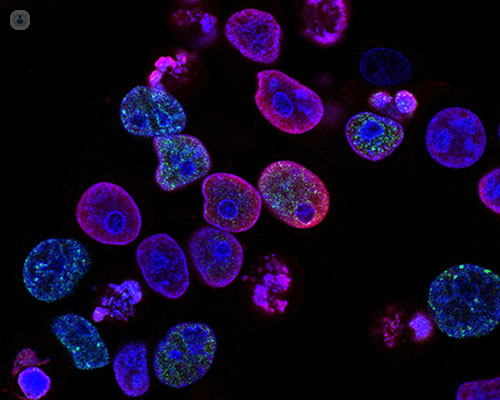Frequently asked questions about immunotherapy
Autore:When we think about cancer treatment, we most often think about chemotherapy, but did you know that immunotherapy is another possible option? Consultant clinical oncologist Dr Muhammed Baki explains how this type of treatment works, the various types available and the associated side effects.
How does immunotherapy work?
Immunotherapy is a type of cancer treatment that uses the body’s immune system to fight cancer. The immune system helps your body fight infections and other diseases and is made up of white blood cells, organs and tissues of the lymph system. Immunotherapy helps the immune system to recognise and attack cancer cells.

What are the different types of immunotherapy available?
There are several different types of immunotherapy treatments available. Options available include checkpoint inhibitors, CAR T-cell therapy, and cancer vaccines.
What types of cancer can be treated with immunotherapy?
Immunotherapy can be used to treat many types of cancer, including melanoma, lung cancer, bladder cancer, kidney cancer, head and neck cancer and liquid cancers like Lymphomas but most importantly, it hasan emerging role in the managemente of breast cancer and Upper GI cancers
What happens during immunotherapy?
During immunotherapy, substances made either by the body or in a laboratory are used to improve or restore immune system function.
The treatment can be given in different ways, including intravenously (into a vein), orally (by mouth), or topically (applied to the skin). The type of immunotherapy you receive will depend on the type of cancer you have and your overall health.
What are the side effects of immunotherapy?
The side effects of immunotherapy depend on the type of immunotherapy and the individual’s response to it. Some common side effects include inflammation, fatigue, fever, chills, nausea, vomiting, diarrhoea, and skin rash.
How long does immunotherapy treatment last?
The length of immunotherapy treatment depends on the type of cancer being treated and how well you respond to the treatment. Some people may receive immunotherapy for a few weeks or months, while others may receive it for several years.
What is the success rate for immunotherapy?
The success rate of immunotherapy varies depending on the type of cancer and many individual factors. Immunotherapy drugs work better in some cancers than others and while they work really well for some people, they don’t work well for all patients.
Overall response rates are about 15 to 20%. However, immunotherapy is already changing the treatment landscape for people with Breast and upper GI cancers.
If you would like to book a consultation with Dr Baki, do not hesitate to do so by visiting his Top Doctors profile today.


